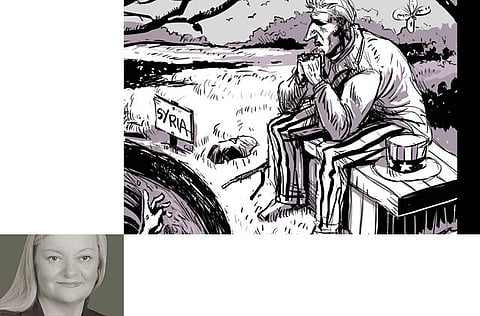World’s inaction has gifted Syria to radicals
West is concerned weapons given to the opposition will be turned against them

Syria is being turned into a site that Armageddon-type movie-makers will die for while the international community goes tut-tut. Too much analysis has resulted in paralysis. The cost of doing virtually nothing to help Syrians resolve this two-year-long nightmare, which for most of us is unimaginable, is mounting daily.
More than 70,000 have been killed. Great swathes of the country have become rubble. Millions have been displaced; hundreds of thousands have fled to Turkey, Lebanon and Jordan where many shiver through the winter under canvas, anxious to know when they can return home or wondering whether their homes will still be standing when they do.
This is a disaster of mega proportions, the type of situation for which the UN was formed to resolve. Yet, Russia’s veto-power in the Security Council has tied its hands. Those of us who imagined that lessons had been learned following the UN’s failure to halt the Rwandan genocide have been proved wrong. So much hand-wringing, so many promises of never again — and yet here we go again!
No wonder the Syrian National Council (SNC), which shelters various opposition groups, is tired of fruitless discussions with the so-called Friends of Syria — so tired in fact that it will not be sending delegates to the Friends of Syria conference scheduled to take place in Rome next month and has rejected invitations to send negotiators to Washington and Moscow. Mealy-mouthed condolences from international diplomats that are not supported by action no longer cut it for them.
Washington has been cheering them on from the sidelines, but will not supply weapons to the Free Syrian Army (FSA) and neither will the European Union (EU), which has initiated a blanket embargo on arms to Syria.
Qatar and Saudi Arabia are critical of the American and European stance, which they see as merely prolonging the agony. Indeed, such lack of tangible progress is undermining the SNC’s credibility with the beleaguered Syrian population. So why will the western powers, individually or with Nato, not get seriously involved, as happened in Libya and more recently in Mali?
Basically, the situation in Syria is complicated on multiple levels. Without a UN Chapter Seven resolution, permitting the use of force, US-led militarily intervention will require a coalition of the willing and that will incur the wrath of Russia that still backs Syrian President Bashar Al Assad in its effort to protect its geopolitical interests in the region.
Moreover, such moves can bring Iran into the fray as Tehran has announced that any attack on Syria will be considered an attack on Iran. There is recent proof that thousands of Iranian Revolutionary Guards and fighters, dispatched by Iran’s proxy in Lebanon, Hezbollah, are in the country and working hand-in-glove with the Syrian Army, setting up base camps close to Syria’s chemical weapons depots.
Gaining respect
As time goes by, military intervention, which should have been swift and decisive, allowing the SNC to take command of the country’s institutions seamlessly, is looking less feasible. The longer the conflict continues, the more it is attracting foreign jihadists and terrorists prepared to launch suicide bombings.
Furthermore, hard line Islamist fighting groups such as the Al Nusra Front — with links to Al Qaida — are committed warriors and are not only enjoying more battlefield success than the FSA, but have gained respect among populations for their provision of social welfare and food in areas under siege.
The Al Nusra Front, designated a terrorist organisation by the US, may account for more than a quarter of the opposition’s fighting force and is said to have ambitions to set up a permanent base in Syria from which to attack Israeli and western targets.
It has also been successful in radicalising formerly moderate Syrian youth. CNN tracked Ebrahim Qobani, a 19-year-old revolutionary in Syria’s northern province of Idlib, who just a year ago enlivened street protests with songs of freedom and democracy and was eager to share his thoughts with western journalists. Since then, he has grown a beard and refuses to be interviewed.
He has been caught on camera, smiling amidst a crowd of Al Nusra Front supporters, watching a small knife-wielding boy perched on a man’s shoulders singing “Our commander is Bin Laden. He showed the Americans the strength of our faith. Our police are [Al] Nusra. Just wait Alawites. We will come to slaughter you.”
The West is now damned if it does and damned if it doesn’t due to its hesitation to come to the opposition’s aid from day one. Naturally, the US and the EU are concerned that any weapons they choose to supply the opposition now will one day be turned against them, or more to the point, against Israel.
In the meantime, Al Assad’s assertions that the perpetrators of violence are terrorists have gained credence, whereas that was not the case two years ago when enthused by the Arab Spring, ordinary citizens took to the streets seeking political reforms.
If radicals and jihadists succeed in ousting the regime and fasten their grip on the nation and its stocks of conventional and unconventional weapons, there may come a day when American and Israeli political figures will regret Al Assad’s departure on ‘better-the-devil-you-know’ grounds.
One thing is for sure, sad to say though — whether the regime stays or goes, Syria’s turmoil will not be over any time soon. There’s plenty of blame and shame to go round with the UN, the US and Russia topping the list.
Sign up for the Daily Briefing
Get the latest news and updates straight to your inbox



